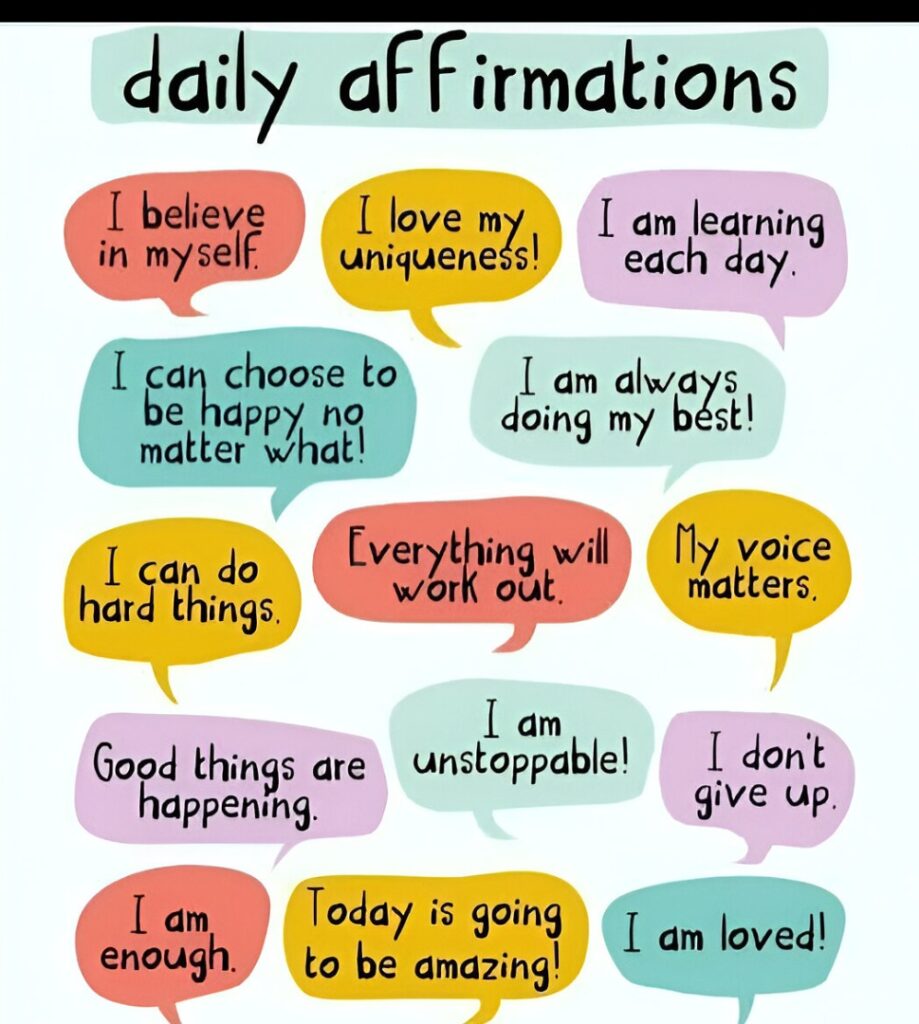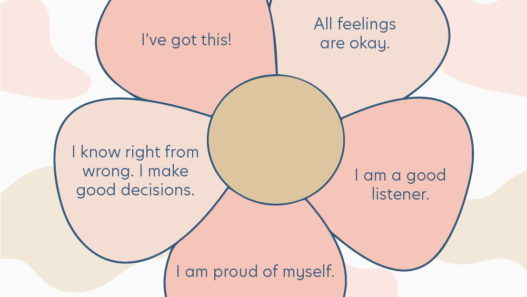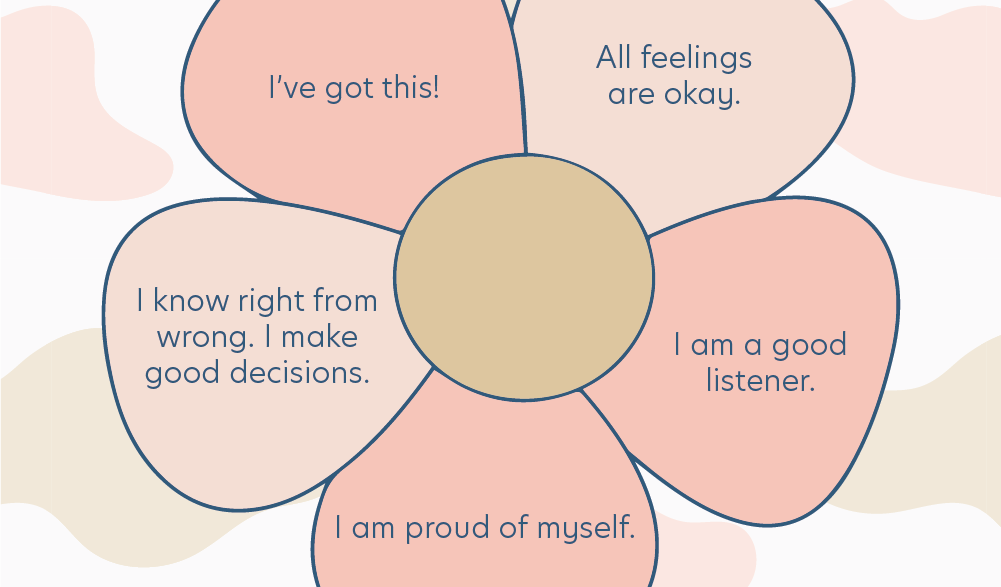Greetings Beautiful People…!
When you’re feeling proud of yourself after achieving something big or feeling down on yourself after a day when you can’t seem to get it right and lose something, the way you deal with yourself, matters.
That’s the main idea behind the word “affirmations”. They are actually short phrases you can repeat to change the way you think and feel about yourself, so it’s all about your thinking too. If you meditate or practice yoga, you may already be familiar with affirmations that they’re often interlinked with these practices.
In a tweet last year, Jennifer Lopez revealed her idea about affirmations : “I am whole, I am good on my own, I love myself.”
“Affirmations are free and easy to practice anywhere, anytime, so they’re a really accessible tool to cope with stressful current events” says Corey Yeager, PhD, a Minneapolis-based licensed marriage and family therapist and the author of How Am I Doing?- 40 Conversations to Have With Yourself (a book about building self-awareness).
“People are latching onto simple ways to help themselves,” he says.
What Are Affirmations?
Affirmations, also known as positive affirmations. Affirmations are the phrases that, when repeated regularly, can have enough ability to change your negative thoughts and behavior patterns.
They can be said aloud or to yourself when you murmur. These statements are usually intended to help shift thinking from negative to positive, motivate an action, reduce stress, persevere through difficult times, and increase self-confidence and well-being.
“Affirmations help build and improve your self-esteem. They can also act as a way of challenging and replacing your negative and anxious thinking when it comes to stress, depression, physical pain, and anxiety,” says a psychotherapist in America.
Affirmations do this by replacing negative self-talk, explains Dr. Yeager. For example, if you made a mistake and then thought, “I’m so stupid,” Yeager says, you’re unintentionally using a negative affirmation.
One psychological theory of self-affirmation comes from research on the self carried out in the 1980s by Claude M. Steele, PhD, a social psychologist.
He predicted that when people have thoughts or experiences that threaten the way they think about or perceive themselves, they are motivated to restore their self-image.
Dr. Steele suggested that people want to have a positive image of themselves, so when they face any kind of threat to that image (such as somebody telling them they’re not good at something), they tend to affirm their sense of self which, in turn, permits them to handle these kind of threats in a more secure and balanced way. The affirmation is a way to help navigate that stressful situation.
How Can Affirmations Boost Your Health?
Some research suggests that positive affirmations are proved to be beneficial for mental health and general well-being.
Sam Zand, DO, a clinical psychiatrist based in Boise, Idaho, points to neuroplasticity as one elaboration for the potential health benefits of affirmations.
Neuroplasticity is the brain’s ability to create new patterns and adapt those patterns, per an article published in Frontiers in Psychology in October 2017.
If we practice affirmations on a regular basis, we may be able to adapt new pathways in the brain, explains Dr. Zand.
It is similar to muscle memory. Instead of flexing our very negative thought processes, we instead create a habit of flexing a more balanced and positive self-view. “I would call affirmations a neuroplastic habit,” he says.
Affirmations Can Boost Your Sense Of Self
In a small randomized controlled trial, researchers used functional magnetic resonance imaging (fMRI) for better understanding of how affirmations affected internal processing and reward systems in the Neuro area.
They found that people who used positive affirmations reflecting their values had more activity in the reward center of their brains (neural processes associated with positive self-view and self-competence) than those who didn’t.
Affirmations Can Help With Behavior Change
Research suggests that affirmations can support people who are trying to make some positive behavioral changes like following a healthy diet plan, limiting alcohol intake, or limiting caffeine intake in short, people who are trying to adapt to a healthy lifestyle according to a meta-analysis of 144 studies.
Affirmations Can Help You Perform Under Stress
Affirmations could also help in improving your ability to problem-solve when you’re stressing over something.
In one randomized controlled study, participants who repeated an affirmation related to a value they saw in themselves like creativity, independence, or sense of humor, performed better in a stressful word-association problem-solving task than those who repeated an affirmation related to a value they didn’t consider important to them.
How To Start An Affirmation Practice
Starting an affirmation practice can be immediate and painless. It requires no equipment or any kind of setup.

Here’s how to get started:
Pick Your Affirmation
The first step in starting an affirmation practice is to pick an affirmation. You can use a phrase you’ve ever heard that really resonates with you, or, Yeager advises, you can also come up with your own affirmation that will serve your purpose.
Some steps are mentioned here
Decide On A Purpose
Think about what you’d like to get from the affirmation, says Yeager. Do you really want it to reassure you of something? Motivate you to achieve your goal? Or boost your confidence?
Keep It Short
Yeager suggests using a phrase that’s about three to seven words long. “[You] want it to be quick, easy, and short enough that it can be repeated over and over,” he says.
Keep It Authentic
An affirmation needs a level of authenticity in order to be used effectively, says Zand. It should be something you have to believe is true, even if you may not feel that truth all the time, he says.
Keep Using It
Once you’ve decided on your affirmation(s) and a time that suits your routine, try to make it a regular habit of it. For example, if you decide it’s going to be for the morning, make it part of your morning routine.
Repeat your affirmations as many times as you need. Practicing affirmations regularly is a key to their effectiveness, especially if you’re trying to change thinking patterns or behaviors.
Affirmations For Confidence
- I’ve an ability to make a difference in the world.
- It’s totally okay that the struggle happened in life.
- I was built to endure any chaos.
Affirmations For Self-Care
- I’m going to be all right and everything will be okay.
- My body is the best body.
- I deserve the best.
Affirmations For Healthy Relationships
- I am worthy of love ,I’m pretty enough to be loved.
- I’m thankful for my partner.
- I’m ready to receive love in abundance.
Affirmations For The Morning
- I am thankful to have woken up today.
- I am going to see the world in a loving and new way.
- Today I’m going to be my best self.
Affirmations For Sleep
- I’m grateful for the repair my body is going to go through.
- I am at peace with everything I cannot control.
- Tomorrow is going to be a great day.
Affirmations For Work Or Productivity
- All I can do is my best.
- Failure is part of success.
- If I keep trying, my successes will increase.


















